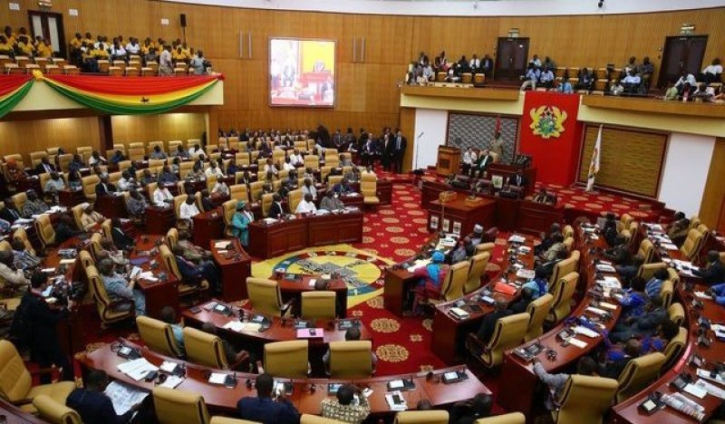The Seventh Parliament of the Fourth Republic of Ghana stands dissolved at 12 midnight, today Wednesday, January 6, 2021, Rev Prof Aaron Michael Oquaye, the Speaker of Parliament, has announced.
The Speaker has then adjourned the House sine die, meaning the House has been adjourned without appointing a day on which to appear or assemble again, but it is expected that Members of the House would come back to say adieu to the Seventh Parliament.
The Eighth Parliament would be ushered in; but in few moments, without a Speaker because the current Speaker, Prof Oquaye, as other former Speakers, would also have to vacate his seat with the dissolution of the out-going parliament.
In the absence of a Speaker in those few moments, the Clerk of Parliament, currently, Mr Cyril Kwabena Oteng Nsiah, the Principal Advisor to the Speaker of Parliament, would act as Speaker and chair proceedings of the House.
Article 95 of the 1992 Constitution of Ghana provides for the election of a speaker from among the Members of Parliament (MPs) or from persons qualified to be MPs.
Key contenders in the race for the Speakership for the Eight Parliament of the Fourth Republic, which begins after midnight of today, January 6, 2021 are the outgoing Speaker Rev Prof Oquaye and outgoing Second Deputy Speaker Alban Sumana Kingsford Bagbin, who is the longest serving MP in the House, but did not run again for Parliament in the 2020 elections.
If re-elected, Prof Oquaye will be the second Speaker after the late Justice Daniel Francis Kweipe Annan, who was elected for the second time.
The new House will also elect the First and Second Deputy Speakers to deputise for the Speaker to chair proceedings, when he is absent from the House.
At 12:01am on 7th January 2021, the Elected Members of the 8th Parliament will convene in the Chamber of Parliament to elect a Speaker and Two Deputy Speakers according to Articles 95, 96 and 100(2).
The two Deputy Speakers are elected from among the Members of Parliament by the members. Both deputy speakers cannot be from the same political party.
Meanwhile, officials from the Electoral Commission has arrived in the House, with election materials to conduct the election of the Speaker and the Deputy Speaker in line with Articles 95 and 96 of the 1992 Constitution of Ghana; and Orders Eight and Nine of the Standing Orders of Parliament.
In his closing remarks, before adjourning the House, Speaker Oquaye acknowledged the contribution of various personalities who helped in the work of the Seventh Parliament.
Notable among the activities were the passage of 209 bills, which the Speaker described as unprecedented in the work of parliaments of the Fourth Republic.
The Speaker cautioned against unguarded statements.
He said it was his honourable privilege to have served as the Speaker of the Seventh Parliament. Majority Leader Osei Kyei-Mensah Bonsu lamented the exit of some experienced legislators from the House, and advised political parties to adopt measures to have experienced members remained in the House.
“It’ll be extremely difficult to replace such persons of monumental industry,” the Majority Leader said.
He described the outgoing parliament, which saw the moving a half-hour motion, and passed the first ever private member’s Bill, the Road Traffic Amendment Bill, as a “watershed parliament.”
Minority Leader Haruna Iddrisu commended the House for the passage of the Vigilantism Act Office of the Special Prosecutor Act, but wondered why people mentioned in reports on political violent acts remained unpunished.
“Corruption and graft are still in Ghana,” he said.
"Welcome to the Parliament where we're 137 137," the Minority Leader said, in apparent reference to the next parliament which may have a slim majority.
He advised President Nana Addo Dankwa Akufo-Addo to reduce the size of the next government, arguing that a large size of government has negative economic implications.
Latest Stories
-
Siisi Baidoo wins Male Vocalist at 2024 Praise Achievement Awards
45 seconds -
Perez Musik celebrates marriage with breathtaking photos
27 mins -
I am not ready to sign any artiste to my record label – Kuami Eugene
54 mins -
Gov’t spokesperson on governance & security calls for probe into ballot paper errors
58 mins -
Free dialysis treatment to be available in 40 facilities from December 1 – NHIA CEO
1 hour -
NHIA will need GHC57 million annually to fund free dialysis treatment – NHIA CEO
1 hour -
MELPWU signs first-ever Collective Agreement with government
2 hours -
I’ve not been evicted from my home – Tema Central MP refutes ‘unfounded’ reports
2 hours -
After Free SHS, what next? – Alan quizzes and pledges review to empower graduates
2 hours -
Wontumi FM’s Oheneba Asiedu granted bail
2 hours -
Alan promises to amend the Constitution to limit presidential powers
3 hours -
Ghana to face liquidity pressures in 2025, 2026 despite restructuring most of its debt – Fitch
3 hours -
NPP’s record of delivering on promises is unmatched – Bawumia
3 hours -
Mahama: It’s time to dismiss the incompetent NPP government
3 hours -
‘It’s extremely embarrassing’ – Ernest Thompson on Ghana’s AFCON failure
3 hours

